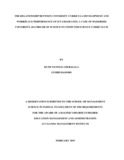The relationship between university curricula development and workplace performance of ICT graduates: A case of Makerere University, Bachelors of Science in Computer Science Curriculum
Abstract
The study examines the relationship between university ICT curriculum development and
workplace performance of ICT graduates of Computer Science at Makerere University. Emphasis
was put on establishing the relationship between ICT curriculum planning and workplace
performance; examining the relationship between ICT curriculum implementation and workplace
performance, and analysing the relationship between ICT curriculum evaluation and workplace
performance. The study was carried out under a mixed methods approach under the sequential
exploratory research design, where quantitative data was used to compliment qualitative data. The
data collection methods adopted were used to explore and obtain viable data regarding curriculum
development. Data collection sources included primary data, which was based on the data
collected form respondents through questionnaires and interviews, and observations which
availed first-hand information. Furthermore, secondary data was generated through document
reviews such as journals, books and articles, among others. Lastly, the data was presented using
tables and narratives. The study revealed that there was a positive relationship between
curriculum planning and workplace performance, as well as between curriculum implementation
and workplace performance. The study revealed that lecturers gave course outlines, course
objective and study rationales to students but there was no baseline for establishing the rationale
for studying the course units. Furthermore, most of the curriculum implementation was more of
theory-based knowledge rather than practical knowledge which was required to meet the
demanding job market. Besides, the curriculum was more top management-oriented, leaving out
contributions by students in the curriculum evaluation process. The study concludes that having
the right input at the planning stage of the curriculum can produce the right output at the
workplace, especially in terms of practical skills and, thus, emphasis was put on inclusion of
practical exams as much as theoretical exams for students to get exposure and knowledge.
However, the study was time constrained and suggests that further comparative research be done
in line with experiences of ICT graduates employed more than five years ago and fresh graduates,
for evaluation purposes of the ICT curriculum.

